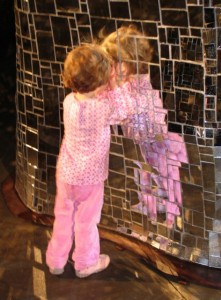“Hello?” He said. “Hello,” she said.
The other day I was riding a bus in San Francisco. I am a tourist, but I try to fit in and belong in the “big city.” To do so, I have become hyper-aware of the rules and I try to follow them, all. Like many public transit systems, younger riders are expected to make way for elder riders, when necessary. On the SF buses, this rule is posted everywhere, and every few stops there is an automated reminder that repeats over the speaker system. On this day, an elderly gentleman boarded the bus after me. He looked at me, and I froze. Although there was a seat available to my left and to my right, I moved over one seat to allow him to take the seat closest the door through which he was entering. I don’t know I did this exactly, I was trying to be nice and respectful, I suppose.
He took it as an invitation to start talking to me. He explained how the first time a young woman had done that was fifteen years ago and he yelled at her and wouldn’t take the seat. “These days,” he said, “I’ll take all the nice things people will do for me.” Aside from “oh,” “yes,” and “yeah” I wasn’t really able to say much for the ten minutes he talked to me (or was it at me?) until my stop. Finally, I broke in mid-sentence and wished him a good day as I hopped off the bus. The smell of his stale breath stayed with me for the two blocks I walked to my destination.
In her book Pyschoanalytic Diagnosis, Nancy McWilliams describes narcissists as, “People whose personalities are organized around maintaining their self-esteem by getting affirmation from outside themselves.”
Was the gentleman who sat next to me displaying narcissism? Perhaps. But, I learned so much about him. He had fought in the war, he was in Germany and had had a secret affair with a German girl in the town where he was stationed. His voice got uncomfortably loud when he described seeing her school text books report that Hitler was a kind man. It is amazing how much pain people carry around. This man was in pain and somehow he seemed to feel better looking into the reflection of my eyes and expressing it.
The term narcissist comes from the Greek myth of Narcissus. Narcissus spent most of his days staring at his own reflection in a pool, that is when he wasn’t chasing around his girlfriend Echo, a muse with whom he fell in love. As her name suggests, she echoed back to Narcissus his own words and philosophies.
Narcissism is something that is present in all of us. Early in our development we start to need another to reflect back to us our states of being, our feelings, emotions, all of it. Some theorists go so far as to say that humans only exist when in relationship to another. The way I conceptualize it is this: I have to know what is not me, before I can understand what is me. And, with the loving gift of a mirror to myself, I can better understand myself.
Sometimes it hurts to be used in this way, to be Echo. And sometimes it hurts to realize you have been Narcissus.
In coming to awareness of these terms, I idealized and wished to be neither, but instead find some higher state where I was able to be in relationship without feeling as though I was using or being used by another. But, I’m starting to realize that we all are both, and that that is not only OK, it may just be part of the deal, the deal that is of being in human relationships.
Are you aware of when your friends, loved ones, strangers need you to pull out your pocket mirror? Are you aware of when you ask them to do so for you? When are you Narcissus and when are you Echo?
Note: I originally published this post on www.depthpsychologytoday.com on March 16, 2009.
![Reblog this post [with Zemanta]](http://img.zemanta.com/reblog_e.png?x-id=ad3f0e5e-fa03-4728-86a9-21cfdc173e21)
